Read the original article on the Raleigh News & Observer website (may require subscription).

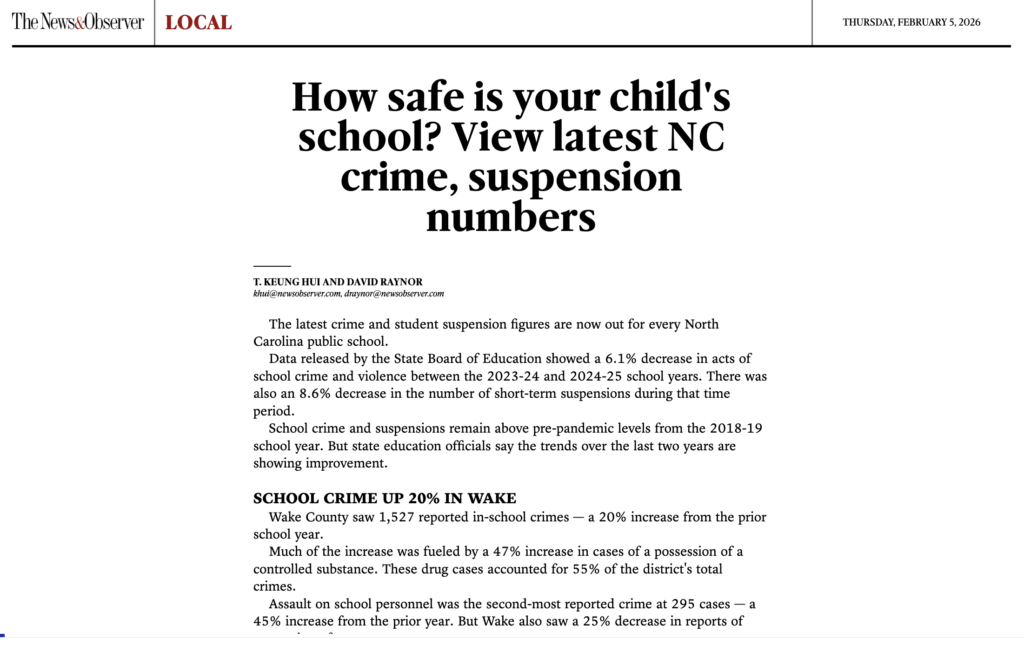

Fentanyl Victims Network of North Carolina
Stronger Together! Grassroots campaign against illicit fentanyl in NC IRS recognized 501(c)(3) non-profit public charity EIN: 88-3921380
More than 99% of students were not involved in a reportable crime on campus, said Michael Maher, chief accountability officer for the North Carolina Department of Public Instruction. Most schools reported only zero to five criminal offenses at their school last year, he said.
Criminal offenses went down again in North Carolina schools during the 2024-25 school year, with another significant drop in offenses for weapon possession, new data shows.
The North Carolina Department of Public Instruction released the latest public school crime statistics during the State Board of Education meeting on Wednesday.
The drop in criminal offenses reported reflects ongoing trends, but so does a continued rise in offenses for drug possession.
Total offenses dropped from 12,212 the year before to 11,470 offenses last year, according to the North Carolina Department of Public Instruction, which released the data Wednesday afternoon.
Continue reading “More drugs, fewer weapons found in schools, crime data shows”Fentvic has updated the 100 County Fentanyl reports using the latest data received from the North Carolina Department of Health and Human Services. Each report is a separate PDF file which can be downloaded.

Visit the Report Page to view all 100 county reports.
Read the original article on the Raleigh News & Observer website.
One hundred and seventy babies, kids and teens in North Carolina died after fentanyl exposure between 2015 and 2024, new state data shows.
Infants, children younger than 5 and teenagers aged 13 to 17 were the most likely to die after fentanyl exposure here during the past decade, according to updated data from the Office of the Chief Medical Examiner.
The data, focused on fentanyl-positive deaths between 2015 and 2024, was presented by the state Office of the Chief Medical Examiner to a committee of the state Child Fatality Task Force last week.
Fentanyl is extremely dangerous because its residue is easy to ingest, and drug paraphernalia like needles or spoon often contains enough fentanyl to kill a small child. In one toddler death cited by the medical examiner’s office, a 1-year-old was exposed to fentanyl left on a cotton ball next to the bed where the mother and child slept.
“Illicit fentanyl really is one of the substances that is predominantly toxic to the pediatric population,” Sandra Bishop-Freeman, chief toxicologist and forensic laboratory director at the state Office of the Chief Medical Examiner, told the Charlotte Observer.

Among teenagers, accidental ingestion often comes via other drugs — even borrowing what a teen thinks is a Tylenol from a classmate could lead to an overdose from a laced pill. In a case cited by the medical examiner’s office, a 16-year-old who died of fentanyl overdose took what they thought was Xanax at a party.
More 17-year-olds died than any other group among minors between 2015 and 2024, with 52 lives lost. Infants less than 6 months old had the second-highest death toll, with the total reaching 24.
Among racial groups, American Indian and Black residents experienced the highest number of pediatric fentanyl-positive deaths in the state, the data says.
And loss of life overall in North Carolina is much higher than a decade ago — growing from 243 deaths in 2015 to 1,954 in 2024.

There is some good news: Despite the number of fentanyl-related deaths remaining elevated compared to decades past, the rate has begun to slow over the past several years.
Fentanyl deaths among all age groups fell 26% statewide in October 2025 compared to the previous year, with deaths in Mecklenburg County down to 142 from 192.
Overdose deaths have been declining the past two years, CDC data released Wednesday shows. North Carolina’s fentanyl overdose rate among all age groups fell by more than 30% between August 2024 and 2025.
Increased access to preventatives, such as the overdose-reversing nasal spray naloxone, could be helping slow overdose death trends.
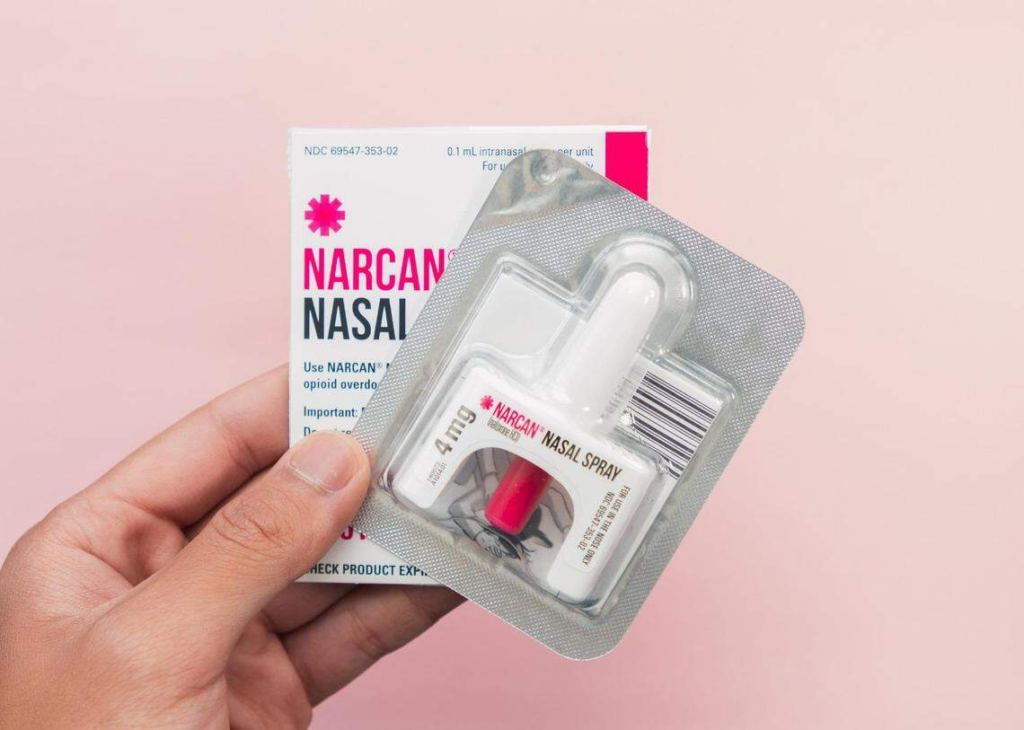
A multifaceted prevention strategy has likely helped contributed to the slowdown in overdose deaths in North Carolina, according to Kella Hatcher, executive director of the NC Child Fatality Task Force. Her group has been studying pediatric overdoses for several years.
“You have to keep working on a combination of efforts to make progress, and that’s the case with many [preventable] causes of death,” Hatcher said.
A 2025 Prevention Block Grant funded several primary prevention programs, including youth education efforts that served close to 9,000 during the year. Another program distributed more than 11,000 lock boxes and 15,000 medication disposal kits, according to Tuesday’s presentation.
Opioid settlement dollars are also funding prevention work in many North Carolina counties. The state is receiving $1.4 billion as part of national settlements with opioid companies, money aimed at bringing resources to communities harmed by the opioid epidemic.
The medical examiner’s office will continue to share data with state and county agencies focused on helping curb the preventable childhood deaths, toxicologist Bishop-Freeman said.
“Despite the trends possibly plateauing, these pediatric deaths are still too many,” Bishop-Freeman said.
The North Carolina Office of Chief Medical Examiner (OCME) has published a new set of reports, visit the OCME reports page to view the new reports.

The Financial Crimes Enforcement Network, a Bureau of the United States Department of the Treasury, has published a document outlining out Chinese Money Laundering works.
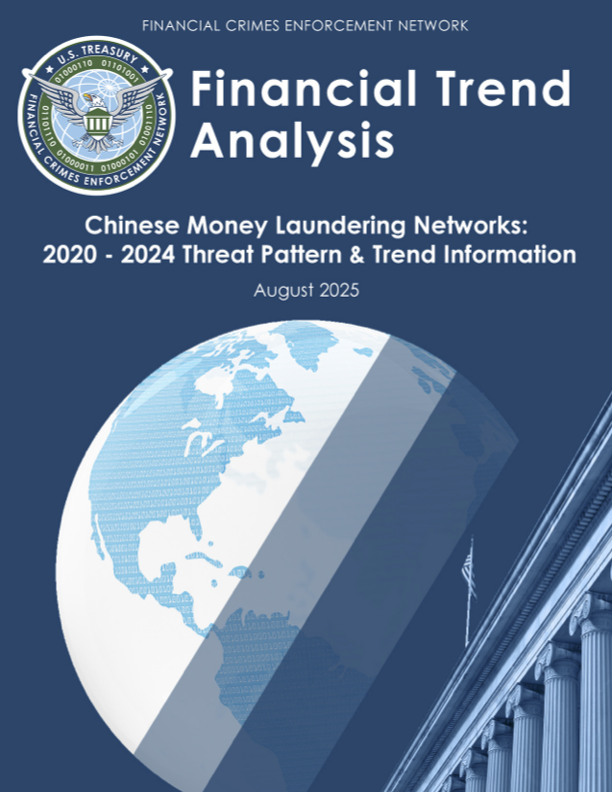
The Partnership for Safe Medicines has updated their handout which explains what a pill press is and how fake pills are made.
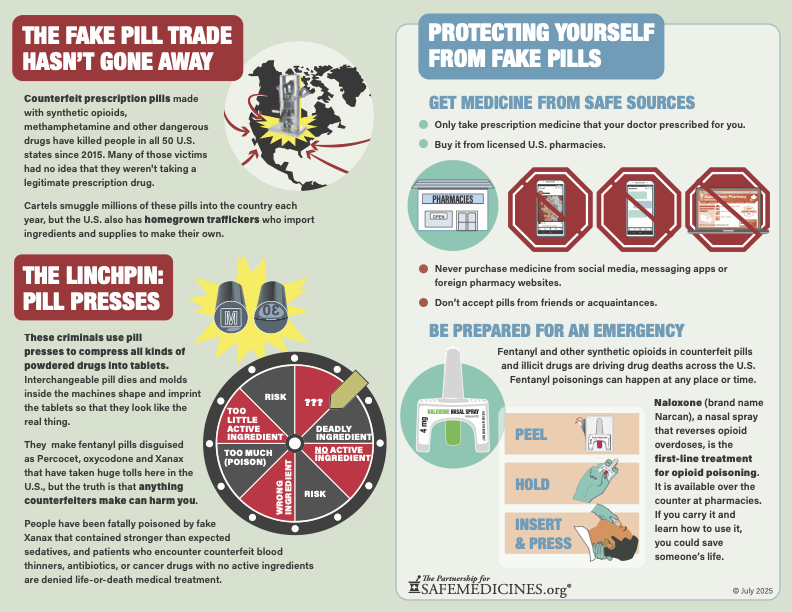
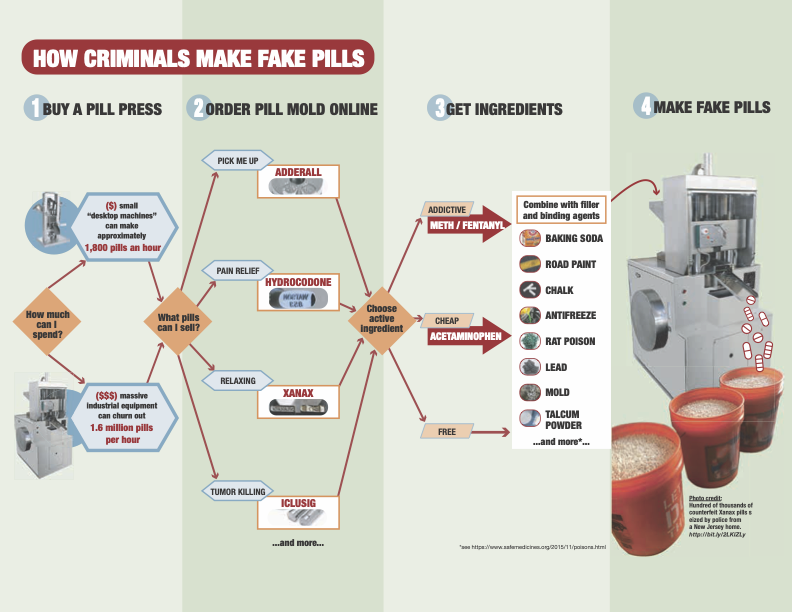
This easy to understand handout can be used to educate people about the risks of counterfeit pills.
The NC OCME has issued their reports for July 2025. Visit the OCME Reports page to see updated reports.

Read the article on the Partnership for Safe Medicines website.

On July 1, Google announced that it was updating its dangerous products and services policy to restrict the promotion of pill presses, encapsulating machines and components they use, such as dies, molds and stamps used to create or imprint pills. The change will affect the Google Ads and Google Shopping platforms starting in September 2025, with six weeks until full implementation.

The U.S. Food and Drug Administration (FDA) announced that states and tribes proposing importation programs can use “a static baseline approach for the cost-savings analysis” instead of trying to account for changes in unpredictable markets.
Read the updated policy on the Google website.
